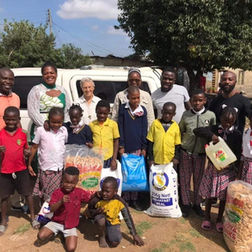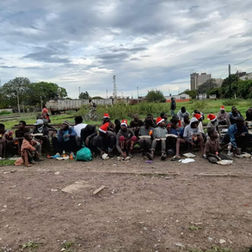Bless Our Children. Guide Their Elders. Guard Their Interests. Keep Them Safe.





Our Work in Zambia
What We Do
We work with street children to protect their dignity and keep them safe from physical and sexual abuse.
Within our program children are withdrawn from hazardous Jobs and imparted with basic education, life skill and vocational skill training in collaboration with our partners.
We establish a Safety Zone for the Child by targeting families and communities.
We have extended our communication and coordination in service provision with other organizations.
We attempt to enhance community capacity about Child Protection and Safety.
Our work extends to oversee and protect the well-being of the Child with regard to their health. Footprints Foundation for Children aims to strengthen its capacity and enhance its works for underprivileged children.
We believe the family is the best place for a child, and trace families for the Child.
We counsel families on various issues related to child abuse, etc.
We empower families for the sake of the Child.
Click here to read our 2023-24 annual report.
Other Major Activities
-
Street Outreach
-
Empowerment and education sponsorship
-
Institutional care
-
Community Outreach
-
Burial support Program
-
Health support Program
Our Partner Programs
We work hand in hand with charitable organizations (Mission Direct, Holy Cross sisters, FMDM sisters, Vision of Hope, Nsansa, African freedom Mission etc) and the government to enhance the well-being of the Child. These include drop-in centres, shelter homes, schools, and rehabilitation centres among others.
Footprints volunteer trip to Lusaka in partnership with UK Charity Mission Direct, Sept 2022.

Sunday services organised for the street children by Pastor Jasper at Nsansa every week.

Our Transitional Home
We are currently in the process of creating a transitional home, to give children a safe space to relax, wash, get a good nights sleep, clean clothes, and TLC away from the dangers of the streets before being taken home to their families.
Footprints initial decision to purchase a transitional home was driven by the strong commitment to providing a secure and nurturing space for vulnerable children. Currently, the focus of development is on renovating a small chalet on the premises and constructing a septic tank. The actual construction of the transitional housing has not yet commenced as fundraising efforts are still underway. However, once all necessary preparations are in place, the chalet will serve as a starting point for the project. At this stage, it is challenging to determine the exact number of children that will be accommodated at the facility, as it will depend on various factors such as available resources ,the number of children willing to be reintegrated back to their families and regulatory guidelines.



Transitional Home Aims
Preperation for Reintergration
The primary objective of the transit home is to prepare street children for successful reintegration into their families and communities. It provides a structured and supportive environment where children can heal, learn, and develop the necessary skills to reintegrate back into their homes.
Strengthening Family Bonds
By facilitating reconciliation and reconnection with their families, the transitional home aims to restore and strengthen the relationships between children and their families,
providing a stable foundation for their successful reintegration.
Empowering
Children
Through life skills training, education,
and academic support, children are empowered with the necessary tools to become self-sufficient, make informed decisions, and pursue a brighter future.
Breaking the Cycle of Homelessness
By addressing the root causes of child homelessness and providing comprehensive support, the transit home contributes to breaking the cycle of homelessness, enabling children to achieve long-term stability and reduce the likelihood of returning to the streets.
Community Development
Successful reintegration of children back into their families not only benefits the children themselves but also contributes to community development. Reintegrated children can become active and productive members of society, positively impacting the overall well-being and development of their communities and families.
Follow-up and Aftercare
The transit home acknowledges the need for continued support even after children are reintegrated into their homes. It establishes a system of follow-up and aftercare services, which involve periodic visits to the children's homes to assess their progress, provide support, and address any challenges that may arise.
























